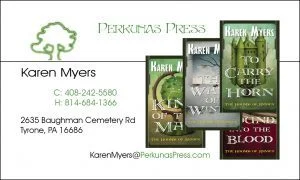Last month we ran a helpful guest post by US fantasy writer Karen Myers about how indie authors should design and use bookmarks to help promote their books. Now here's a companion piece addressing the role of business cards in marketing self-published books. Over to Karen…
Why Do Indie Authors Need Business Cards Anyway?
Let’s be blunt. If you’re in business and you don’t have business cards, how do you expect to support a professional impression?
- A business card is a courtesy to a potential buyer or colleague or vendor. It keeps them from having to write down your contact information themselves.
- Better yet, it’s another opportunity to sell your product and seduce potential buyers.
Remember, you have more than one persona as an indie author. You are a writer, and you are also a publisher. Those are different roles and require different websites, and that means different business cards.
Business Cards for Self-publishers and Small Presses
 My publisher (me) is Perkunas Press. I created this card a couple of years ago, and I now have three series and nine novels to offer (so far), so I’ll be re-designing these cards soon. They use the branding elements for the business, of course, and as much colorful material from my book covers at the time to make a pleasant impression.
My publisher (me) is Perkunas Press. I created this card a couple of years ago, and I now have three series and nine novels to offer (so far), so I’ll be re-designing these cards soon. They use the branding elements for the business, of course, and as much colorful material from my book covers at the time to make a pleasant impression.
The covers by themselves should convey the genre (fantasy) without explicit statement, but certainly declaring your genre(s) on your card can’t hurt.
Business Cards for Indie Authors
 My author website is HollowLands. I’m not happy with this card — I made it in a hurry and based it on the website banner which creates too busy a background for legibility. The fonts are also not ideal. Still, it gets the job done for the short run, and when I replace it, I’ll have learned better.
My author website is HollowLands. I’m not happy with this card — I made it in a hurry and based it on the website banner which creates too busy a background for legibility. The fonts are also not ideal. Still, it gets the job done for the short run, and when I replace it, I’ll have learned better.
For All Kinds of Business Cards
I left the backs bare and unglossy to allow people to write on them, a useful tip from my decades in the corporate world. When you meet someone, you write info about them on the back of their card — reminders, action items, etc. When you give someone a card, you can add more details on the back, such as a time/place to get together.
Lessons Learned for Next Time
I’ll be adding a newsletter-signup link to both cards for next time.
I’ll also do what many commercial ad agencies do — I’ll add different artwork to the back of the cards, varying by series. Each artwork will feature the first book of a series, with brief series info, rather like miniature bookmarks. If three people drop by your event, and each gets a card with a different back, they’ll compare them and talk about it — just what you want.
Karen Myers has a longer post about business card, bookmarks and other business stationery for authors on her author blog here.
OVER TO YOU What are your top tips for creating an appropriate and functional business card for indie authors and self-publishers?
#Authors - top tips on designing & using business cards to promote your #selfpub books - via @HollowLandsBook Share on XIN CASE YOU MISSED IT – A similar post sharing top tips about using bookmarks for book marketing






[…] How to Design and Use Business Cards to Market Your Self-published Books […]
[…] Myers explains how to design and use business cards to market your books, while June Stevens Westerfield shows how to create an author brand when you write in multiple […]
I like the idea of leaving the back blank, as well. I currently use both sides of my business cards — one side is me as a writer with my real name, my author name, and how to get in touch with me (both website and email); the other side is my formatting business, Anessa Books, and how to reach me for that business. So, depending on why I’m handing someone a card I can hand it with one side or the other face up.
When I’m handing something to a potential reader, I’ll give them a bookmark with pictures of the first book of each series I write, and my website url. I like the idea of putting how to sign up for my newsletter, though. That’s a great idea. Thanks!
Focus can sometimes be useful. You (and I) may wear many hats, but the people you give cards to mostly only wear one. So I find it helpful to have one card per “hat” rather than an all-purpose card, which I think most recipients find confusing.
People who want to know me in a casual business context think of me as a publisher. Potential readers think of me as a writer. People to whom I sell business services think of me as a service provider. (Not to mention my music and photography personas: http://www.karenlmyers.org)
In the corporate world, there aren’t many multi-hat wearers, but I’ve met people who have a role in both an acquiring and an acquired firm, and naturally they have different cards, depending.
[…] Karen Myers Top tips on why you should produce business cards for your self-published books and authorpreneur […]
I use Vistaprint. It is a good idea to leave the back blank for you or someone to write on. I shall do that next time I order my biz cards.
Great article! In the UK, I’ve found Bristol printer Brunelone.com is very good value for business cards. I don’t know of any bookmark printers, though. Can anyone recommend one?